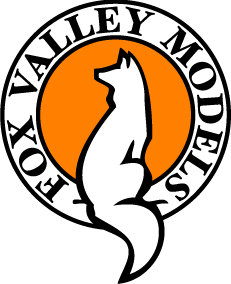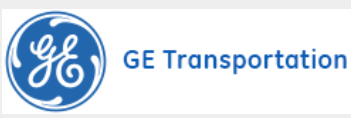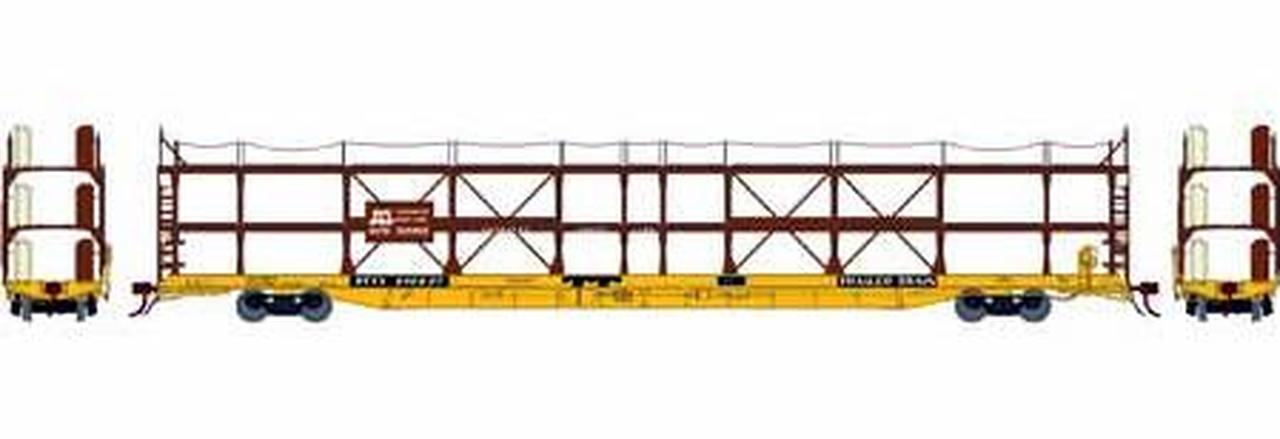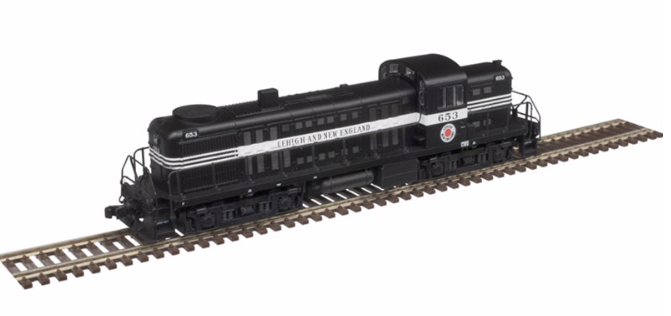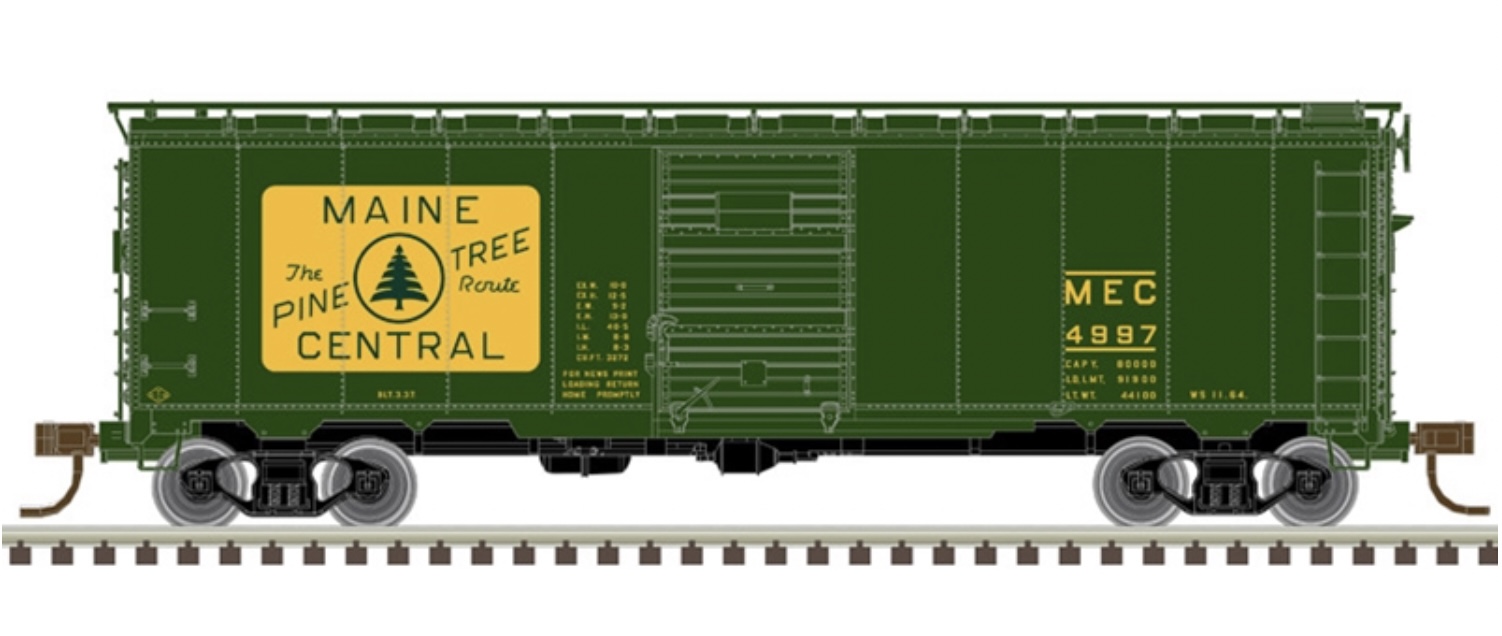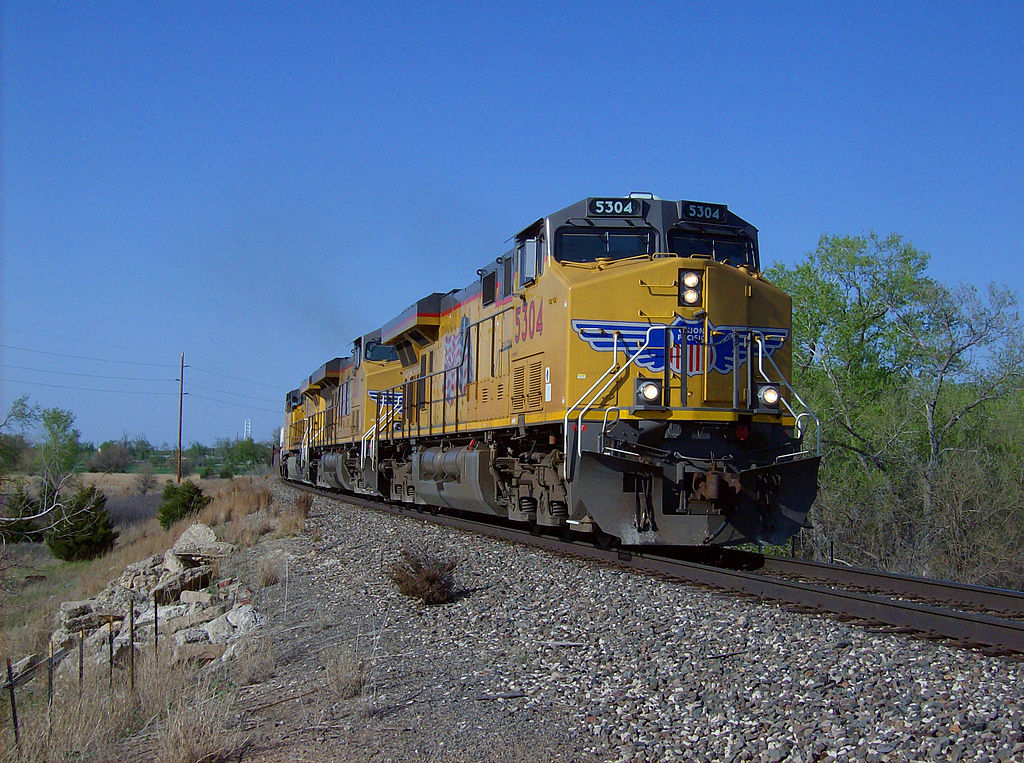Model Information: This model was introduced in 2009 (ES44AC), 2010 (ES44DC) and 2013 (ES44C4). The Fox Valley ES44AC was their first N scale locomotive model. It is an amazing first effort. The paint and detailing are outstanding (exceeding even the likes of Atlas and Kato). They run quietly and can pull a lot of cars on a flat surface and handle well even on steep inclines.
This is a typical modern engine with a split frame, blackened metal wheels, dual flywheels, and LED lighting.
This ES44C4 is using FVM standard DC body; FVM tooled new trucks to represent the added levers and cylinders that raise and lower the middle axle on the real deal. This is done to adjust the amount of tractive effort applied to the rails on the 4 drive axles.
This is a typical modern engine with a split frame, blackened metal wheels, dual flywheels, and LED lighting.
This ES44C4 is using FVM standard DC body; FVM tooled new trucks to represent the added levers and cylinders that raise and lower the middle axle on the real deal. This is done to adjust the amount of tractive effort applied to the rails on the 4 drive axles.
DCC Information:
- Original Fox Valley Models Accepts NEM-651 plug-in decoder.
- Scale Trains produced DCC Ready Accepts Next-18 plug-in decoder.
Prototype History: The Evolution Series is a line of diesel locomotives built by GE Transportation Systems, initially designed to meet the U.S. EPA's Tier 2 locomotive emissions standards that took effect in 2005. The first pre-production units were built in 2003. Evolution Series locomotives are equipped with either AC or DC traction motors, depending on the customer's preference. All are powered by the GE GEVO engine.
The Evolution Series was named as one of the "10 Locomotives That Changed Railroading" by industry publication Trains Magazine. It was the only locomotive introduced after 1972 to be included in that list. The Evolution Series, mainly the ES44DC, ES44AC, and ET44AC, are some of the best-selling and most successful freight locomotives in United States history, far surpassing the output of Electro-Motive Diesel.
ES44AC
The ES44AC (Evolution Series, 4400 HP, AC traction) replaced the AC4400CW model in the General Electric catalogue. The GE Evolution Series ES44AC locomotive represents an incredible combination of power, performance and efficiency. Originally designed to meet US EPA Tier 2 emissions, the ES44AC locomotive utilizes a 12-cylinder GE Evolution Series engine with 4-stroke combustion technology to maintain horsepower, reduce emissions, and lower fuel consumption compared to GE’s predecessor 16-cylinder FDL engine. From 2005 to 2015, the ES44AC became GE’s standard North American locomotive and a compelling platform for others worldwide.
ES44AH (C45AH)
The "H" in ES44AH stands for "heavy", which is in reference to a combination of subsystems that produce high levels of tractive effort at low speeds. UP's "AH" types are similar to CSXT's, except for their Hi-Ad trucks, and are designated C45AH's by Union Pacific.
ES44C4
The ES44C4 (Evolution Series, 4400 HP, AC traction, 4 powered axles) was introduced in 2009. While similar to the ES44AC, the ES44C4 has two traction motors per truck, instead of the conventional three such as on the ES44AC. The center axle of each truck is unpowered, giving an A1A-A1A wheel arrangement. BNSF Railway is the launch customer for this model.
ES44DC
The ES44DC (Evolution Series, 4400 HP, DC traction) replaced the Dash 9-44CW model in the General Electric catalogue. Primary users are BNSF Railway, CSX Transportation, and Canadian National Railway.
ET44AC
The ET44AC (Evolution Series Tier 4, 4400 HP, AC traction) replaces the ES44AC model. The GE Evolution Series ET44AC locomotive meets the U.S. Environmental Protection Agency’s (EPA) stringent Tier 4 emission standards without the use of any aftertreatment, enabling railroads to gain significant savings through urea infrastructure cost avoidance and reduced operational costs. Part of the Ecomagination-certified Evolution Series, the ET44AC locomotive is designed to meet Tier 4 emissions standards by reducing emissions by 70% below Tier 3 requirements. GE Transportation has invested $600M in the Evolution Series since its introduction in 2005 and is the first supplier of Tier 4 locomotives for Class 1 railroads.
ET44AH (C45AH)
Successor of the ES44AH.
ET44C4
Successor of the ES44C4.
From Wikipedia
From GE transportation website
Read more on American-Rails.com
The Evolution Series was named as one of the "10 Locomotives That Changed Railroading" by industry publication Trains Magazine. It was the only locomotive introduced after 1972 to be included in that list. The Evolution Series, mainly the ES44DC, ES44AC, and ET44AC, are some of the best-selling and most successful freight locomotives in United States history, far surpassing the output of Electro-Motive Diesel.
ES44AC
The ES44AC (Evolution Series, 4400 HP, AC traction) replaced the AC4400CW model in the General Electric catalogue. The GE Evolution Series ES44AC locomotive represents an incredible combination of power, performance and efficiency. Originally designed to meet US EPA Tier 2 emissions, the ES44AC locomotive utilizes a 12-cylinder GE Evolution Series engine with 4-stroke combustion technology to maintain horsepower, reduce emissions, and lower fuel consumption compared to GE’s predecessor 16-cylinder FDL engine. From 2005 to 2015, the ES44AC became GE’s standard North American locomotive and a compelling platform for others worldwide.
ES44AH (C45AH)
The "H" in ES44AH stands for "heavy", which is in reference to a combination of subsystems that produce high levels of tractive effort at low speeds. UP's "AH" types are similar to CSXT's, except for their Hi-Ad trucks, and are designated C45AH's by Union Pacific.
ES44C4
The ES44C4 (Evolution Series, 4400 HP, AC traction, 4 powered axles) was introduced in 2009. While similar to the ES44AC, the ES44C4 has two traction motors per truck, instead of the conventional three such as on the ES44AC. The center axle of each truck is unpowered, giving an A1A-A1A wheel arrangement. BNSF Railway is the launch customer for this model.
ES44DC
The ES44DC (Evolution Series, 4400 HP, DC traction) replaced the Dash 9-44CW model in the General Electric catalogue. Primary users are BNSF Railway, CSX Transportation, and Canadian National Railway.
ET44AC
The ET44AC (Evolution Series Tier 4, 4400 HP, AC traction) replaces the ES44AC model. The GE Evolution Series ET44AC locomotive meets the U.S. Environmental Protection Agency’s (EPA) stringent Tier 4 emission standards without the use of any aftertreatment, enabling railroads to gain significant savings through urea infrastructure cost avoidance and reduced operational costs. Part of the Ecomagination-certified Evolution Series, the ET44AC locomotive is designed to meet Tier 4 emissions standards by reducing emissions by 70% below Tier 3 requirements. GE Transportation has invested $600M in the Evolution Series since its introduction in 2005 and is the first supplier of Tier 4 locomotives for Class 1 railroads.
ET44AH (C45AH)
Successor of the ES44AH.
ET44C4
Successor of the ES44C4.
From Wikipedia
From GE transportation website
Read more on American-Rails.com
Road Name History: The Norfolk Southern Railway (reporting mark NS) is a Class I railroad in the United States; began in 1982 and 1990. With headquarters in Norfolk, Virginia, the company operates 36,200 route miles in 22 eastern states, the District of Columbia, and has rights in Canada from Buffalo to Toronto and over the Albany to Montreal route. NS is responsible for maintaining 29,000 miles, with the remainder being operated under trackage rights from other parties responsible for maintenance. The common commodity hauled on the railroad is coal from mines in Indiana, Kentucky, Pennsylvania, Tennessee, Virginia, and West Virginia. The railroad also offers the most intermodal network in eastern North America.
NS is a major transporter of domestic and export coal. The railroad's major sources of the mineral are located in: Pennsylvania's Cambria and Indiana counties, as well as the Monongahela Valley; West Virginia; and the Appalachia regions of Virginia, Kentucky, and Tennessee. In Pennsylvania, NS also receives coal through interchange with R.J. Corman Railroad/Pennsylvania Lines at Cresson, Pennsylvania, originating in the "Clearfield Cluster". NS's export of West Virginia bituminous coal, begins transport on portions of the well-engineered former Virginian Railway and the former N&W double-tracked line in Eastern Virginia to its Lambert's Point coal pier on Hampton Roads at Norfolk. Coal transported by NS is thus exported to steel mills and power plants around the world. The company is also a major transporter of auto parts and completed vehicles. It operates intermodal container and TOFC (trailer on flat car) trains, some in conjunction with other railroads. NS was the first railway to employ roadrailers, which are highway truck trailers with interchangeable wheel sets.
The Norfolk Southern Railway's parent Norfolk Southern Corporation is a Norfolk, Virginia-based parent company. Norfolk Southern Corporation was incorporated on July 23, 1980 in the Commonwealth of Virginia and is publicly traded on the New York Stock Exchange (NYSE) under the symbols NSC. The primary business function of Norfolk Southern Corporation is the rail transportation of raw materials, intermediate products, and finished goods across the Southeast, East, and Midwest United States. The corporation further facilitates transport to the remainder of the United States through interchange with other rail carriers while also serving overseas transport needs by serving several Atlantic and Gulf Coast ports. As of October 1, 2014 Norfolk Southern Corporation's total public stock value was slightly over $34.5 billion.
Read more on Wikipedia.
NS is a major transporter of domestic and export coal. The railroad's major sources of the mineral are located in: Pennsylvania's Cambria and Indiana counties, as well as the Monongahela Valley; West Virginia; and the Appalachia regions of Virginia, Kentucky, and Tennessee. In Pennsylvania, NS also receives coal through interchange with R.J. Corman Railroad/Pennsylvania Lines at Cresson, Pennsylvania, originating in the "Clearfield Cluster". NS's export of West Virginia bituminous coal, begins transport on portions of the well-engineered former Virginian Railway and the former N&W double-tracked line in Eastern Virginia to its Lambert's Point coal pier on Hampton Roads at Norfolk. Coal transported by NS is thus exported to steel mills and power plants around the world. The company is also a major transporter of auto parts and completed vehicles. It operates intermodal container and TOFC (trailer on flat car) trains, some in conjunction with other railroads. NS was the first railway to employ roadrailers, which are highway truck trailers with interchangeable wheel sets.
The Norfolk Southern Railway's parent Norfolk Southern Corporation is a Norfolk, Virginia-based parent company. Norfolk Southern Corporation was incorporated on July 23, 1980 in the Commonwealth of Virginia and is publicly traded on the New York Stock Exchange (NYSE) under the symbols NSC. The primary business function of Norfolk Southern Corporation is the rail transportation of raw materials, intermediate products, and finished goods across the Southeast, East, and Midwest United States. The corporation further facilitates transport to the remainder of the United States through interchange with other rail carriers while also serving overseas transport needs by serving several Atlantic and Gulf Coast ports. As of October 1, 2014 Norfolk Southern Corporation's total public stock value was slightly over $34.5 billion.
Read more on Wikipedia.
Brand/Importer Information: Fox Valley Models is a small supplier of
model railroad and related products. FVM
started by finding solutions to different
challenges that model railroaders were
faced with. Our first products resulted
from a need to equip custom built
passenger cars with tinted windows made
of an ideal material; thin, flexible, easy to
cut, simple to install, available in multiple
colors and be affordable. We met those
needs and even included a frosted
version for the car's lavatory windows.
Other challenges inspired additional products including wooden grade crossings, trestles and different lineside structures. As our product line expands, input and requests from friends and customers help shape the product selection further.
Future products, under development, include more parts, structures, details and rolling stock. We strive to offer a good quality product at an affordable price.
Other challenges inspired additional products including wooden grade crossings, trestles and different lineside structures. As our product line expands, input and requests from friends and customers help shape the product selection further.
Future products, under development, include more parts, structures, details and rolling stock. We strive to offer a good quality product at an affordable price.
Item created by: George on 2016-11-26 20:57:39
If you see errors or missing data in this entry, please feel free to log in and edit it. Anyone with a Gmail account can log in instantly.
If you see errors or missing data in this entry, please feel free to log in and edit it. Anyone with a Gmail account can log in instantly.



